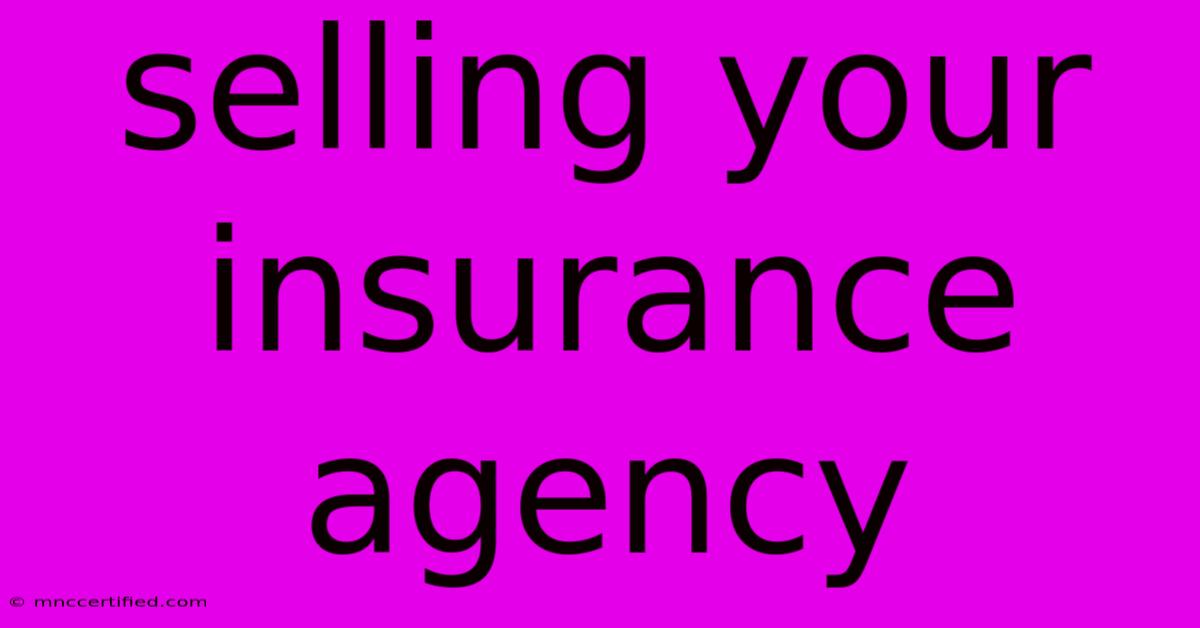Selling Your Insurance Agency

Table of Contents
Selling Your Insurance Agency: A Comprehensive Guide for a Smooth Transition
Selling your insurance agency is a significant decision, marking the culmination of years of hard work and dedication. A well-executed sale can ensure a comfortable retirement and a positive legacy. However, a poorly planned sale can lead to financial losses and unforeseen complications. This comprehensive guide will walk you through the essential steps to maximize your return and minimize potential pitfalls.
Preparing Your Agency for Sale: The Foundation for Success
Before even considering potential buyers, you need to meticulously prepare your agency. This involves more than just dusting off the financial statements.
1. Financial Health is Paramount:
- Clean Books: Potential buyers will meticulously scrutinize your financial records. Ensure your accounting is accurate, up-to-date, and adheres to industry best practices. Any discrepancies or inconsistencies can significantly devalue your agency.
- Profitability Analysis: Highlight your agency's profitability trends. Show consistent growth, strong margins, and a healthy cash flow. Understanding your Key Performance Indicators (KPIs) is crucial.
- Valuable Assets: Identify and document all assets, including client lists, software licenses, and physical property. A detailed asset inventory is essential for accurate valuation.
2. Client Relationships: The Heart of Your Business
- Client Retention: High client retention rates are extremely attractive to buyers. Demonstrate a history of strong client relationships and low churn.
- Client Portfolio Diversity: A diversified client portfolio, with a mix of personal and commercial lines, adds value. Buyers seek stability and reduced risk.
- Documentation: Maintain comprehensive client files, including policy information, communication logs, and renewal dates. This demonstrates organizational efficiency and professionalism.
3. Operational Efficiency: Streamlining for Success
- Technology & Systems: Modern, efficient technology and streamlined processes are highly desirable. Showcase your use of CRM systems, agency management software, and automated workflows.
- Employee Retention: A stable and experienced team significantly enhances the agency's value. Document employee skills and responsibilities.
- Compliance: Ensure complete compliance with all relevant regulations and licensing requirements. Any compliance issues can severely impact the sale price.
Finding the Right Buyer: Strategies for a Successful Sale
Once your agency is prepared, it's time to find the right buyer. There are several avenues to explore:
1. Brokerage Firms: Expertise and Wide Reach
Insurance brokerage firms specialize in connecting insurance agencies with potential buyers. They handle the valuation process, marketing, and negotiations, significantly reducing your workload.
2. Private Equity Firms: Strategic Investments
Private equity firms often acquire insurance agencies as part of a larger portfolio. They're typically interested in larger agencies with substantial growth potential.
3. Strategic Acquisitions: Synergistic Partnerships
Consider selling to a competitor or a larger insurance agency that can leverage your existing client base and operational expertise. This strategy can offer significant benefits for both parties.
4. Internal Succession Planning: A Smooth Transition
If you have family members or key employees interested in taking over, internal succession planning can ensure a smooth and seamless transfer of ownership.
Negotiating the Sale: Protecting Your Interests
The negotiation phase is crucial. Don't rush into a deal without professional legal and financial advice.
1. Valuation: Determining Fair Market Value
Accurate valuation is paramount. Several methods exist, including asset-based valuation, income-based valuation, and market-based valuation. Engage a qualified appraiser for an objective assessment.
2. Negotiating the Terms: Protecting Your Interests
Clearly define the terms of the sale, including the purchase price, payment schedule, and any contingency clauses. Engage experienced legal counsel to review the contract before signing.
3. Post-Sale Agreement: Ensuring a Smooth Transition
A well-defined post-sale agreement will outline your responsibilities during the transition period. This may include client introductions, training for new staff, and maintaining confidentiality.
Conclusion: A Successful Sale Requires Planning and Expertise
Selling your insurance agency is a complex process requiring careful planning, meticulous preparation, and professional guidance. By following the steps outlined in this guide, you can significantly increase your chances of achieving a successful and profitable sale, ensuring a secure financial future and a positive legacy for your business. Remember, seeking advice from experienced professionals—insurance brokers, accountants, and legal counsel—is crucial throughout this entire process.

Thank you for visiting our website wich cover about Selling Your Insurance Agency. We hope the information provided has been useful to you. Feel free to contact us if you have any questions or need further assistance. See you next time and dont miss to bookmark.
Featured Posts
-
Manchester United Vs Bodo Glimt Predicted Xi
Nov 29, 2024
-
Walmarts Black Friday Ad Early Look
Nov 29, 2024
-
2024 Puskas Award Nominees Revealed
Nov 29, 2024
-
Business Insurance Fort Worth
Nov 29, 2024
-
Mike Russ Insurance Licensing
Nov 29, 2024